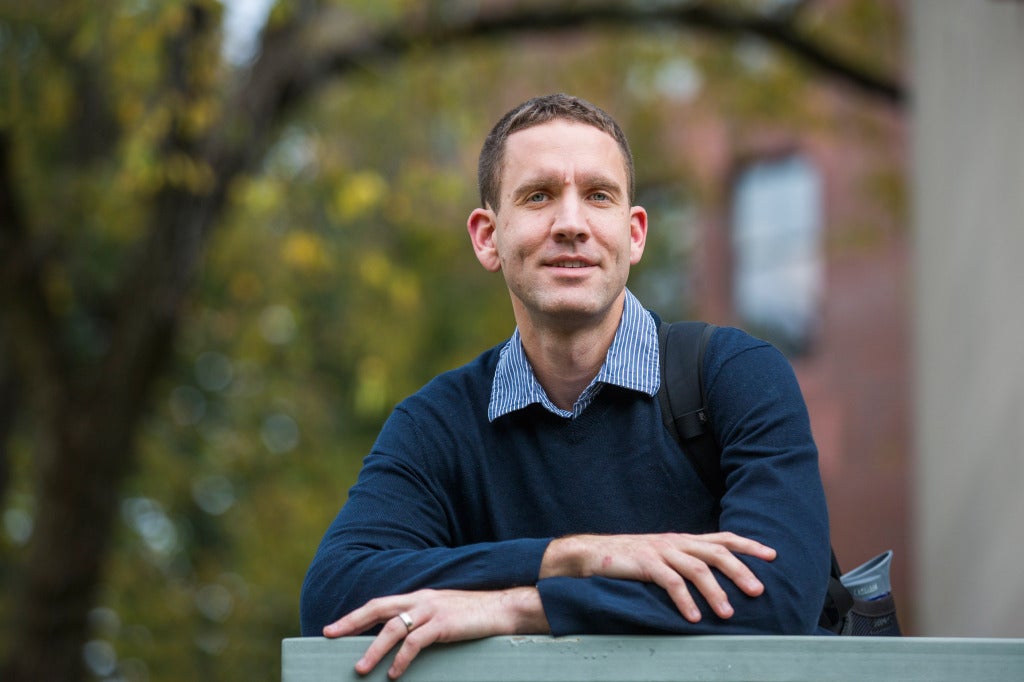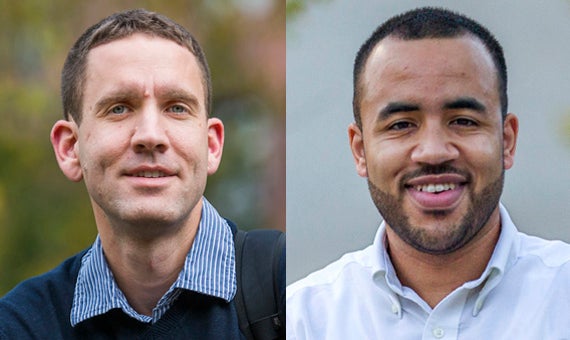Many of the veterans currently enrolled at Harvard Law School carry the lessons learned in the military into the law school classroom. Their service and unique perspective enrich the entire HLS community, elevating awareness about the legal and policy issues affecting veterans and the significance of law in contemporary warfare.
Below, two of the 12 U.S. military veterans in this year’s entering class at Harvard Law School share their experiences in the military and at HLS.
David E. White Jr.

Two years ago, stationed in the Kandahar region of Afghanistan as a platoon leader with the U.S. Army, then-Lieutenant David E. White Jr. ’17 found himself early one morning sipping tea with a village elder while explaining why his men were searching for bomb-making materials. Outreach to locals, and showing respect to their leaders, is essential in fighting the insurgency: “We want the local populace on our side as much as possible,” says White, a 2009 graduate of the U.S. Military Academy at West Point.
“Little did I know, as I was leaning up against a six-inch wall made of mud, clay and hay, that behind that wall was over 300 pounds of homemade explosives,” recalls White, whose men found the cache hidden under a haystack. With that discovery, and the detention of seven insurgents, the mission crippled the region’s deadliest bomb-making cell. “Our platoon got very lucky that day,” he says.
During his year-long deployment, White, born and raised in upstate New York to a family with a history of military service, led his 21-man platoon on other missions including re-integrating former Taliban fighters into Afghan society, training more than 150 Afghan National Security Forces on the role of the military and police in a constitutional society, and leading his unit’s strike force to partner with special forces from various branches of the U.S military and other nations to capture mid-level Taliban and al-Qaeda insurgents. To undermine Taliban funds, White also instituted an alternative seed program for local farmers to persuade them not to grow poppy.
While the platoon was on combat patrol with a three-woman Army engagement team, an insurgent on a motorcycle blew himself up, seriously injuring White and four other soldiers. White, who ushered the engagement team to safety away from a possible follow-up attack, didn’t realize he was wounded until a medic pointed out that his arm was bleeding profusely, the artery nicked and requiring two tourniquets. Although White received the Purple Heart, he insists that the “true hero” of the day was a badly wounded sergeant who hid his injuries in order to participate in the evacuation of others.
Evacuated to a medical hospital in the U.S., White recuperated for three weeks—he says he continues to gain almost full use of his arm—before returning to West Point in the Warrior Transition Unit, designed to help wounded, injured, and ill soldiers return to active duty or continue their education. Inspired by those around him, White was promoted to Captain and appointed as second-in-command of the program, leading a staff of 14 soldiers and six civilians in successfully transitioning 60 soldiers in job and college searches.
When the program ended, in 2013, White was named as a Diversity Outreach Officer at West Point, where his success was phenomenal. In just one year, he assisted 940 minority applicants with applying to the Academy, and increased his region’s enrollment of African American cadets by 87 percent. White’s and his colleagues’ efforts resulted in an institutional record of 13.6 percent black students and improved the incoming class’s credentials.
White, who chose both West Point and HLS because of their emphasis on building leaders, says that as a black man, he shared a common experience with potential African American cadets. “I would explain that West Point is a slingshot to the middle class in every way you can think about: it’s a free education at one of the country’s top educational institutions, it’s world-renowned for leadership with an ethical and moral base, and beyond that, you are serving your country,” he says. In addition, graduates reach the management level faster than in any other arena, he says: “Less than two years after graduation, I found myself in Afghanistan leading a platoon,” an opportunity he emphasized to young women and men from minority communities.
While White says he loved the Army, he was ready to take his education “to the next level in a unique way.” At HLS, he finds himself surrounded by tomorrow’s leaders and is “absolutely encouraged to see people from all different backgrounds working together.” White—whose younger brother Dan White, also a West Point graduate, is currently serving in Kuwait—expects to start his legal career in the private sector. “But I know I want to get back into public service,” he adds.
Luke A. Whittemore

For 60 years, NATO’s Striking and Support Forces (SFN), or STRIKFORNATO, a maritime command center, was based in Naples, Italy. But as soon as Lt. Commander Luke A. Whittemore LL.M. ’15 arrived there in the summer of 2011 as chief legal advisor, he learned the entire operation would be moving to Lisbon, Portugal ten months later—and that he would be deeply involved in making it happen.
“Moving a command consisting of 10 Nations—now 11—in less than a year is an extremely difficult challenge,” says Whittemore, a graduate of the U.S. Naval Academy, “particularly given all the international agreements of different levels that need to be established to ensure sound legal status and support for the command and its personnel in a new country.” Whittemore was part of a small team that travelled extensively through Europe for meetings regarding the move, including several high-level international negotiation sessions to hammer out agreements.
“It involved a lot of international law and legal agreements ranging from how electricity will be charged on based to how our forces will be treated, and the status of our forces in Portugal,” he says. “It really brought home to me how a multinational coalition can work.”
With the help of other NATO attorneys and Navy JAG (Judge Advocate General) lawyers, Whittemore handled the legal aspects and the move was completed on time. He spent the next two years finalizing SFN’s legal status, and also providing legal guidance on four major multinational military exercises that NATO undertook in that period.
Today, Whittemore is an LL.M. student at HLS, where he is focusing on international law and the law of war. Upon graduation, he’ll be assigned to the Department of Defense Office of General Counsel in Washington D.C., as he’d hoped, since his wife, Laurie Weeks, works as a policy analyst for the federal government in the capital.
For a kid from Lawrence, Kansas, a career in the Navy might seem surprising. But Whittemore fell in love with the ocean during summers in Seattle to visit his grandfather, who’d been a ceramics engineer on the Manhattan Project. Whittemore chose the Naval Academy for its outstanding oceanography program; he graduated from its honors program, ranking third in his graduating class. He then matriculated at Oxford University as a William H.G. Fitzgerald Scholar, earning two masters of science degrees, in environmental change and management, and economic and social history.
Assigned next as a surface warfare officer aboard the USS San Jacinto, a guided missile cruiser based in Norfolk, Va., Whittemore served in an unexpected collateral role as a legal officer, handling minor legal duties under the supervision of JAG officers. Intrigued, he applied to the Navy’s Legal Education Program, through which he earned his J.D. at Georgetown University Law Center. After attending the Naval Justice School in Newport, R.I., he was assigned to the Naval Legal Service Office in Washington, D.C., where he handled a variety of legal matters for military personnel and their families. He also represented 94 wounded sailors and marines seeking compensation for service-related injuries. The hardest cases, he says, were those involving Post Traumatic Stress Disorder and traumatic brain injury; many of his clients had served in Iraq and been injured by blasts from improvised explosive devices.
“Obviously, it was very challenging,” he says, yet deeply meaningful “in terms of the reward you get” working with wounded veterans.
Whittemore then volunteered to serve in Iraq, where he worked for six months at the U.S. Embassy in Baghdad as the rule of law specialist in detainee operations, focusing on assisting the Iraqis in reestablishing their prison system. He next served a year as special assistant for strategic planning for the Office of the Judge Advocate General in D.C., before heading to Naples with NATO.
“The faculty, staff, and students at Harvard Law could not have been more welcoming in my move here and start of my studies,” he says. “I feel extremely fortunate to have been given the opportunity to study at Harvard, which will help me continue to contribute in our Navy’s incredible Judge Advocate General’s Corps.”
